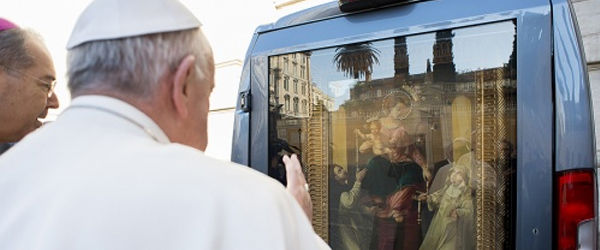After all the attention garnered by “Nuns on the Bus,” it’s a great time for the nation’s women religious to speak up about the plight of the poor and struggles of the working class — and, especially, to shine a moral light on the growing wealth gap in American society.So stressed Sister Simone Campbell, the executive director of NETWORK, a national social justice lobby, to more than 400 mostly women religious at a Sept. 15 lecture-workshop, “Election 2012 — Catholics Vote for the Common Good.”“Now the glorious news about Nuns on the Bus is every member of Congress wants to make friends with nuns right now,” said the lobbyist and Sister of Social Service, drawing laughs from her audience. “We are like golden, do you believe? And they thought we were just old and dying out,” which got even more laughs.“But, see, isn’t that the beauty of it. Because we are old enough, we can be free and no longer worried about who we are. But we know we are people of deep prayer, deep commitment — amazing commitment to the people who live at the margins of our society, to those in poverty, to the struggling immigrant. And we can be a voice like no one else because we’re free. What do we have to lose, for heaven’s sake? Right?“And isn’t that glorious? Isn’t that glorious?” she repeated. “So use it. Use it.”The 66-year-old woman religious has become somewhat of an A-list celebrity herself in recent weeks. On Sept. 6 she delivered what the Washington Post called a “spirited speech” at the Democratic National Convention, partly because she described the GOP budget plan as “immoral.” A few days later she went one-on-one with satirist Stephen Colbert, who remarked on his Comedy Central TV show, “Well, I’m not going to debate the Gospel with a nun.” There was also an interview on public television with veteran journalist and commentator Bill Moyers.Growing gapAt the daylong brown-bag event held in a packed convention room at the Religious of the Sacred Heart of Mary Provincial Center in Montebello, Sister Campbell pointed out that the top 1 percent of the U. S. population has 34 percent of the country’s wealth. “This is the greatest wealth disparity since 1929 when the stock market crashed in the United States,” she said. “More and more wealth has shifted to the top, while more and more people fall to the bottom.”The native Californian, who is approaching her golden jubilee as a woman religious, said the gap between haves and have-nots “really widened” with Reaganomics, and has pretty much continued growing ever since. She reported that by 2009 the disparity had reached a very wide racial divide. While the median net wealth of white Americans was about $114,000, it was only $6,000 for Hispanics and $5,600 for African Americans.And then there’s what she called “gender poverty,” with female-headed households six times more likely to be in poverty than families headed by men. Sister Campbell stressed that the wealth gaps particularly fly in the face of the principles of Catholic social teaching. These include the dignity of all human beings as creations of God, preferential option for the poor, a living wage for work, promoting the common good, participation as a human right, protection of creation and solidarity. “So what do we do?” the nun wondered aloud.She said a big priority for NETWORK was reforming the tax code, so that any benefits would help the poor and working class first. Just wages should go to those who helped create wealth for others. Affordable housing was another vital matter as well as lowering the monetary eligibility criteria for safety net programs. After lunch, attendees broke into small groups to literally practice, under the watchful eye of the seasoned lobbyist, how to talk to others who think differently about these issues. The woman religious said she knows from firsthand experience that simply declaring another person’s position is dead wrong, that they have to change, doesn’t work.What works is accepting your opponent’s frame of reference, while trying to find some “center ground” and shared values. “If we want to communicate with others, we’ve got to understand where the person is coming from,” she explained. “That’s how you build bridges.”On the roadSister Campbell told The Tidings that the almost immediate popularity of Nuns on the Bus — as well as her own media attention — just amazed her. She quipped, “Now I’m famous,” before breaking up and shaking her head. “What a joke. I had no idea.”On June 17, the first day the Sisters hit the road, that evening in Des Moines, Iowa, a local priest celebrated a blessing service and more than 300 people showed up. Many weren’t even Catholics, but Protestants, Jews and even some Buddhists. Over 15 days, the nuns ran up 2,700 miles hitting 32 communities in nine states. And the interfaith turnout was the same.Every day they visited some work run by other nuns who worked directly with the marginalized. They went to congressional offices to either “thank them or scold them” for their vote on the GOP budget bill. They also did interviews with the media and met with newspaper editorial boards, including the Chicago Sun Times and the Cleveland Plain Dealer.“A lot of our work both on and off the bus has been trying to build up an alternative faith voice in the political realm,” said Sister Campbell, who has been at the helm of NETWORK for nearly eight years. “The far right thought they had a claim on faith. And one of the things I think is so important about all this is to say there are alternative voices within the faith community.” {gallery width=100 height=100}gallery/2012/0921/srsimone/{/gallery}

